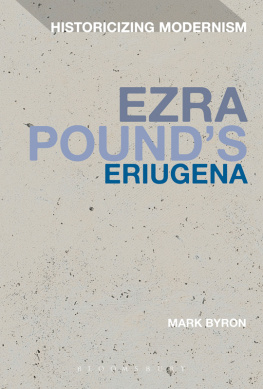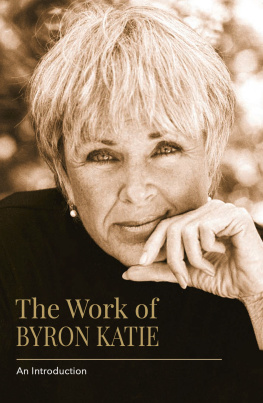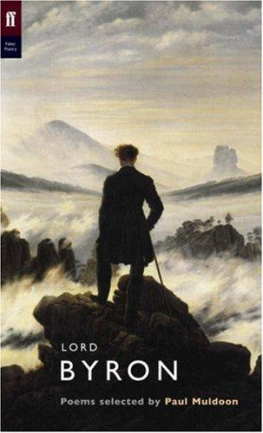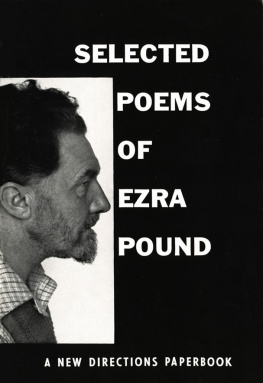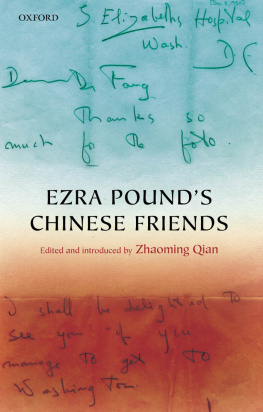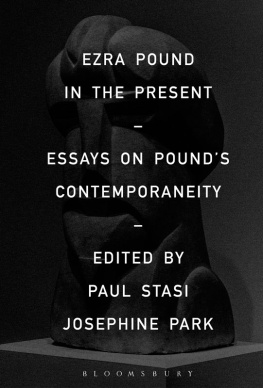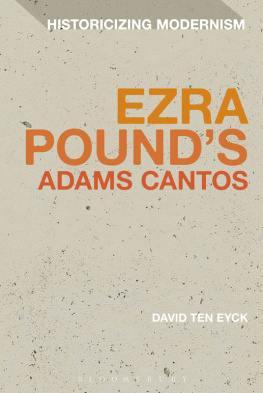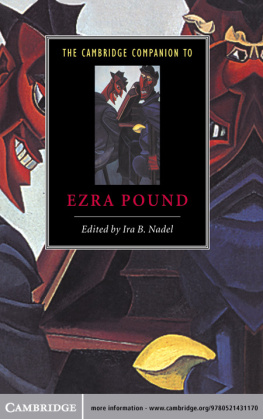Byron - Ezra Pounds Eriugena
Here you can read online Byron - Ezra Pounds Eriugena full text of the book (entire story) in english for free. Download pdf and epub, get meaning, cover and reviews about this ebook. City: London, year: 2014, publisher: Bloomsbury Academic, genre: Science. Description of the work, (preface) as well as reviews are available. Best literature library LitArk.com created for fans of good reading and offers a wide selection of genres:
Romance novel
Science fiction
Adventure
Detective
Science
History
Home and family
Prose
Art
Politics
Computer
Non-fiction
Religion
Business
Children
Humor
Choose a favorite category and find really read worthwhile books. Enjoy immersion in the world of imagination, feel the emotions of the characters or learn something new for yourself, make an fascinating discovery.
Ezra Pounds Eriugena: summary, description and annotation
We offer to read an annotation, description, summary or preface (depends on what the author of the book "Ezra Pounds Eriugena" wrote himself). If you haven't found the necessary information about the book — write in the comments, we will try to find it.
Ezra Pounds Eriugena — read online for free the complete book (whole text) full work
Below is the text of the book, divided by pages. System saving the place of the last page read, allows you to conveniently read the book "Ezra Pounds Eriugena" online for free, without having to search again every time where you left off. Put a bookmark, and you can go to the page where you finished reading at any time.
Font size:
Interval:
Bookmark:
Ezra Pounds Eriugena
Historicizing Modernism
Series Editors
Matthew Feldman, Reader in Contemporary History, Teesside University, UK; and Erik Tonning, Director, Modernism and Christianity Project, University of Bergen, Norway
Assistant Editor: David Tucker, Postdoctoral Researcher, University of Chester, UK
Editorial Board
Professor Chris Ackerley, Department of English, University of Otago, New Zealand; Professor Ron Bush, St. Johns College, University of Oxford, UK; Dr Finn Fordham, Department of English, Royal Holloway, UK; Professor Steven Matthews, Department of English, University of Reading, UK; Dr Mark Nixon, Department of English, University of Reading, UK; Professor Shane Weller, Reader in Comparative Literature, University of Kent, UK; and Professor Janet Wilson, University of Northampton, UK.
Historicizing Modernism challenges traditional literary interpretations by taking an empirical approach to modernist writing: a direct response to new documentary sources made available over the last decade.
Informed by archival research, and working beyond the usual European/American avant-garde 1900-45 parameters, this series reassesses established readings of modernist writers by developing fresh views of intellectual contexts and working methods.
Series Titles :
Arun Kolatkar and Literary Modernism in India: Moving Lines , Laetitia Zecchini
Broadcasting in the Modernist Era , edited by Matthew Feldman, Henry Mead and Erik Tonning
Ezra Pounds Adams Cantos , David Ten Eyck
Great War Modernisms and The New Age Magazine , Paul Jackson
Katherine Mansfield and Literary Modernism , edited by Janet Wilson, Gerri Kimber and Susan Reid
Modern Manuscripts , Dirk Van Hulle
Reading Mina Loys Autobiographies , Sandeep Parmar
Reframing Yeats , Charles Ivan Armstrong
Samuel Beckett and Arnold Geulincx , David Tucker
Samuel Beckett and Science , Chris Ackerley
Samuel Beckett and the Bible , Iain Bailey
Samuel Becketts More Pricks Than Kicks , John Pilling
Samuel Becketts German Diaries 19361937 , Mark Nixon
Virginia Woolfs Late Cultural Criticism , Alice Wood
Ezra Pounds Eriugena
Mark Byron

Contents
Historicizing Modernism
This book series is devoted to the analysis of late-nineteenth- to twentieth-century literary Modernism within its historical context. Historicizing Modernism thus stresses empirical accuracy and the value of primary sources (such as letters, diaries, notes, drafts, marginalia or other archival deposits) in developing monographs, scholarly editions and edited collections on Modernist authors and their texts. This may take a number of forms, such as manuscript study and annotated volumes; archival editions and genetic criticism; as well as mappings of interrelated historical milieus or ideas. To date, no book series has laid claim to this interdisciplinary, source-based territory for modern literature. Correspondingly, one burgeoning sub-discipline of Modernism, Beckett Studies, features heavily here as a metonymy for the opportunities presented by manuscript research more widely. While an additional range of canonical authors will be covered here, this series also highlights the centrality of supposedly minor or occluded figures, not least in helping to establish broader intellectual genealogies of Modernist writing. Furthermore, while the series will be weighted towards the English-speaking world, studies of non-Anglophone Modernists whose writings are ripe for archivally based exploration shall also be included here.
A key aim of such historicizing is to reach beyond the familiar rhetoric of intellectual and artistic autonomy employed by many Modernists and their critical commentators. Such rhetorical moves can and should themselves be historically situated and reintegrated into the complex continuum of individual literary practices. This emphasis upon the contested self-definitions of Modernist writers, thinkers and critics may, in turn, prompt various reconsiderations of the boundaries delimiting the concept Modernism itself. Similarly, the very notion of historicizing Modernism remains debatable, and this series by no means discourages more theoretically informed approaches. On the contrary, the editors believe that the historical specificity encouraged by Historicizing Modernism may inspire a range of fundamental critiques along the way.
Matthew Feldman
Erik Tonning
While I take great pleasure in acknowledging my many debts incurred throughout the long life of this book project, the range and extent of those debts are formidable. This project germinated from a short section of my doctoral dissertation concerning the function of light imagery in The Pisan Cantos . It is with relief and a sense of belatedness that I can finally give public thanks to my doctoral supervisor at Cambridge University, J. H. Prynne. It is true that my intellectual trajectory would not nearly resemble its present form without his unique insights, astonishing generosity and timely hilaritas , not least my sense of the way Pound assimilated his views on Chinese writing and Confucian thought with his study of Neoplatonism and Aristotelian ontology within his poetics. My deepest thanks also go to Andrew Burns, whose work on the twelfth-century reception of Eriugena comprises an important aspect of Eriugena Studies. As students we were lucky to participate in Peter Dronkes final seminar series, on the Periphyseon , before his retirement. It was truly an early medieval experience. Indirectly, John Marenbon also deeply influenced my understanding of Eriugenas thought, especially his absorption of the Categoriae Decem .
The gradual assimilation of the themes upon which this monograph is built was a process that took shape in several key locations, and with the insightful support of individuals and a variety of institutions. Foremost, I want to thank Mary de Rachewiltz for allowing me to consult many of Pounds books during visits to Schloss Brunnenburg in Dorf Tyrol, not least the several volumes of Francesco Fiorentino. Marys hospitality is legendary: she has actively facilitated and made possible a large number of intellectual projects on Pound and modern poetry, without which the field would be immeasurably poorer. My preliminary research during a visit to Brunnenburg in July 2006 was supported by a Travelling Fellowship from the Australian Academy of the Humanities. Besides Brunnenburg, the other key research institution in my project is the Beinecke Rare Book and Manuscript Library at Yale University. I began work in earnest on Pounds Cavalcanti notebooks with the assistance of a Donald C. Gallup Fellowship in January 2006, and was greatly assisted by the generosity of Patricia C. Willis, Curator of the American Literature Collection, and Nancy Kuhl, her formidable successor. The Beinecke is blessed with a truly extraordinary staff, whose deep knowledge of the collections is matched by a spirit of generosity and hospitality. Too many people to name individually extended their assistance to me in visits in 2006, 2012 and 2013. I would like to thank especially both Naomi Saito and Ann Marie Menta for their considerable help in matters of accessing the collection and obtaining crucial reproductions.
The development of the final manuscript of this book was enabled by funding entailed in an Australian Research Council Discovery Project, the subject of which was scholarly editorial methods in Modernist Studies (20112013). Whilst the present book represents a slight tangent from the central premise of that project, it nonetheless forms a critical element of the bigger picture, especially with regard to Modernist manuscript studies. The early medieval subject matter that so powerfully drew Pounds attention suggests the rich potential Medieval Studies presents to Modernist scholars. I was able to air aspects of this project in a number of conference presentations, principally at the Ezra Pound International Conference in London (2011) and Dublin (2013), as well as at Modernism, Christianity and Apocalypse, expertly convened by Erik Tonning at Solstrand, Norway, in 2012. A brief teaching fellowship at Rikkyo University, Tokyo, in 2011 also allowed me to present aspects of to audiences at Rikkyo University, Tokyo Womans Christian University, and Nagoya University. My warmest thanks to Dorsey Kleitz, David Ewick, Tateo Imamura and Akitoshi Nagahata for their kind hospitality, and to Yoshiko Kita for making the fellowship possible.
Next pageFont size:
Interval:
Bookmark:
Similar books «Ezra Pounds Eriugena»
Look at similar books to Ezra Pounds Eriugena. We have selected literature similar in name and meaning in the hope of providing readers with more options to find new, interesting, not yet read works.
Discussion, reviews of the book Ezra Pounds Eriugena and just readers' own opinions. Leave your comments, write what you think about the work, its meaning or the main characters. Specify what exactly you liked and what you didn't like, and why you think so.

